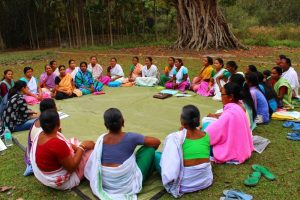Organization Development (OD)
SeSTA has a group based review and feedback mechanism and system for collecting feedback from community and stakeholders. Through yearly workshops, we continuously engage to streamline our internal processes, facilitate cross learning among colleagues, reinforce our commitment to collective leadership and most importantly, strengthen our resolve to work with the poorest communities in rural Northeast India effectively and efficiently. SeSTA also has a prevention of Sexual Harassment at work place policy and the Internal Complaints Committee.

Human Resources Development
SeSTA’s HR model is a “reverse pyramid” model. The general aspiration today is move from rural areas to towns and cities. In SeSTA, we believe that development of villages is equally important as cities and towns. This development is only possible if enough opportunities are triggered in our rural areas. And to initiate this trigger, SeSTA places professional field teams who embed and work directly with the community in remote villages.
SeSTA’s continuous training programmes for staff focus on enhancing human, technical and conceptual capabilities required by each role in the four broad arenas of work, viz. personal application and growth, grassroots transformation, organization roles, and building strategic alliances. SeSTA also has collaborations with Azim Premji University (APU) to groom professionals on
various aspects and paradigms of development. It organizes a yearly practice of “Retreats” for its employees to enable introspective discussions and decisions for personal, organizational and professional growth.
Given the dearth of professional talent to work in rural Northeast India, SeSTA has initiated an Executive Traineeship Programme (ETP) to attract human resource in the development sector. Every year, under SeSTa’s Executive Traineeship Programme (ETP), trainees are recruited and groomed through a systematic process from various institutions, into development professionals through praxis method under the guidance of experienced mentors.
Management Information System (MIS)
SeSTA has an online MIS which is fed by real time tablet based data application. Community Cadres (CC) collect data from each family and upload the same on an online platform. Against each family, particular livelihoods intervention is captured with all the details. SeSTA has a Monitoring, Evaluation and Learning (MEL) system based on its Theory of Change (ToC).
